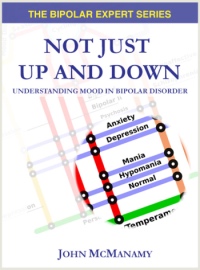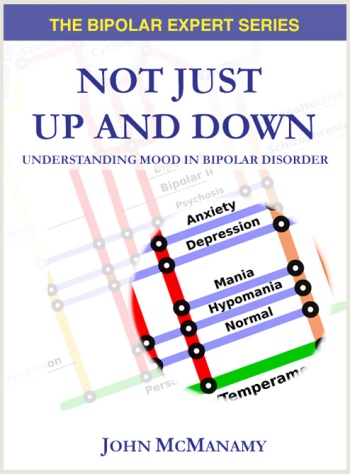Family and Relationship Fallout
 |
Mental illness is a family and relationship illness.
|
Family and relationships in mental illness. "The realization that a family member's mental illness may never go away is a crucial identity turning point in the caregiver's career," David Karp tells us in his 1999 "Burden of Sympathy."
Prior to that, he points out, a family member was likely to have thought the meds were going to fix everything. Then the weeks turn into months or years, and the reality sets in. As Dr Karp tells us:
They find it harder to muster the compassion felt during the early stages of the illness. It is also harder for them to avoid feelings of anger and resentment.
Let's explore the situation from several viewpoints ...
My New Book!

Purchase now.
Mental Illness - The Suffering Parent
A 2001 Child and Adolescent Bipolar Foundation poll reported "off the charts" levels of stress experienced by parents. Most significantly, 97 percent of those who responded were women, indicating where the burden of responsibility for raising a bipolar child rested.
Sources of stress included: anticipating rages (walking on eggshells), child unable to do self-care or chores, less time for parental self-care, less time for marriage, less time for parental friendships, child unable to do homework.
The stress list also included: witnessing self-harm or suicide attempts by the child, less time for other children, child's raging in public, parent's own depression, verbal abuse from child, and - to add insult to injury - accusations from family, friends, or school of bad parenting.
Insurance problems were also stressful, not to mention finding a doctor who took their concerns seriously, plus stigma, parents' headaches, and fear of disclosing the disorder. Last but not least: absenteeism due to the child's illness, parent's physical illness, loss of job due to the child's illness, and the breakup of marriage due to the stress of the child's illness.
(For dealing with a bipolar kid, check out Child Bipolar et seq.)
The Loved One Dealing with Depression Fallout
A blissful honeymoon soon deteriorates into a marital cold war. Loving Husband has morphed into Nightmare on Elm Street, with things deteriorating from bad to worse, culminating in a public mad scene in a restaurant and exit stage right on the distressed wife's birthday.
The vignette is from Anne Sheffield's 2003 "Depression Fallout: The Impact on Couples and What You Can Do to Preserve the Bond." The author, a veteran of both her own and her mother's depression, is a font of practical wisdom.
Telling the Mr or Ms Hyde in your life that something is wrong, for instance, can be as delicate a procedure as diffusing a bomb. Avoid the straight-out, "You may be clinically depressed," Ms Sheffield advises, and try something along the lines of, "I've been noticing lately that you're not sleeping well at night. Are they working you too hard at the office?" From there, one looks to gradually break down the elaborate defenses and nudge Cleopatra Queen of Denial into an open discussion. Personal presentation helps, Ms Sheffield adds, hair in place, good shoes. "Selling" depression to an unwilling partner, after all, is pure marketing.
Fine, you've got your partner to talk. Now what? Ms Sheffield suggests starting with a list of four specific items, such as "No arguing or angry displays in front of the children." Nonspecific instructions to lighten up or think positive, she warns, "might as well be issued in Chinese." When being verbally abused, it is better to leave the room, she advises, than joining battle, which is self-defeating.
Once your partner has bought into his or her diagnosis, there are many ways of assisting with his or her recovery. But depression can be contagious, a result of the loss of self-esteem and stress that comes from living with Miss or Mr Congeniality. For both your own good and your partner's, then, Ms Sheffield advises, it is crucial to put yourself first. A wide range of coping skills can help, but what is important is mastering the skills that are within your reach. Instead of running five miles a day, for instance, it might be more realistic to take a daily walk. "To whatever extent possible," she urges, "put some psychological and physical distance between you and your sad mate."
That psychological and physical distance may ultimately involve sleeping in a single bed in another state, but there is life after depression fallout, Ms Sheffield concludes. Bailing out on Hamlet doesn't mean ending up like Ophelia.
Managing Your Bipolar Loved One
Julie Fast and John Preston's 2004 "Loving Someone with Bipolar Disorder: Understanding and Helping Your Partner" serves up some very practical suggestions, starting with both partners reaching an agreement on common behavior problems. Once you the two of you know what you're up against, the authors advise, it may be possible to respond to the first signs of unusual behavior before they spin out of control.
The emphasis is on respond rather than react. For instance, instead of saying, "What's your problem?", try something along the lines of, "I can see that you're angry. How can I help you?" This can become a bit problematic when your partner has just blown $5,000 on a stupid chair and you're the one seething with anger, but these situations - and other bipolar catastrophes - can often be avoided by strict daily adherence to ironclad check-in procedures.
The authors devote a whole chapter to mood triggers, and place strong emphasis on partners working together to reduce the stress in the living environment, from keeping work and social obligations under control to more discriminate TV viewing to proper diet, sleep, and exercise.
"Root trigger" is a term they have come up with to define a trigger that may set off other triggers, such as - bad news from work followed by a poor night's sleep resulting in a miserable day at work building into anger that leads to a serious domestic quarrel and triggers thoughts of life not worth living. Recognizing the root trigger as it occurs and mobilizing quickly can spare both partners a lot of grief.
Ultimately, the authors acknowledge, you may have to make some very tough decisions. "Maybe you have lived in crisis for so long," they write, "you haven't had the chance to examine what your future will look like realistically, if you stay with your partner. What do you need to do to create the life that you want?"
That's a question only you can answer.
Protecting Your Kids from Your Own Depression
William Beardslee of Harvard and Boston Children's Hospital has worked with families for more than 20 years, and has authored one landmark study on the effect of parental mood disorders on children, plus numerous other studies. He also lived through the trauma of his sister's severe depression and suicide. His 2002 book, "Out of the Darkened Room: When a Parent is Depressed," begins with these words of wisdom:
When parents become depressed, they bear a double burden. Even as they wrestle with the darkness that clouds their lives, they must struggle to maintain their roles as guardians of their children's future. Making matters worse, depression is often mystifying both to the sufferer and those around them.
Depression, Dr Beardslee contends, is a family illness which psychiatry still treats as an individual illness. The children who are kept in the dark must cope with the disruptions their parents undergo, themselves becoming an at-risk population. What is at stake starts with a consideration of three factors: 1) Depression in one or both parents; 2) Other problems parents face, such as alcoholism or anxiety; 3) Difficulties earlier in the child's life, such as problems with learning to read.
With none of these factors present, says Dr Beardslee, six percent of children get depressed. The number doubles to 12 percent with one factor present, but with all of them in play an alarming one half of all children become depressed. In Dr Beardslee's words:
The message is: Get help for yourself before depression can lead to the 'negative chain' of other events that, together, can harm your child. Build your child's protective resources and do not let your depression cascade into the multiple risk factors that can undermine your child's health.
"Breaking the silence" is Dr Beardslee's term for getting a parent's depression out into the open, where the illness is freely discussed among all the family members. Given the nature of depression to make one uncommunicative, this is often easier said than done. Together with your partner, Dr Beardslee advises, decide what should be discussed and not discussed. Try to show your children that the two of you are united in caring for them. Keep in mind that kids at different ages will deal with the matter very differently. One six-year-old, for instance, was afraid she might catch her father's depression by using his toothbrush.
Reassure your kids, Dr Beardslee goes on to say, that you will be okay and the illness will not overwhelm your family. Emphasize that no one is guilty or to blame. Speak to the positives, and talk about the illness and its treatment. Tell your children what actions you're taking (such as getting treatment), discuss events your children have witnessed, talk about things that are unusual or upsetting, and help your children feel comfortable enough to talk about things that frighten them.
"Open, ongoing communication," Dr Beardslee concludes, "is the foundation of the resilience we want in our kids," not always easy when kids tend to be kids, but that's the point - family adversity may result in our children growing up fast, but it shouldn't rob them of their innocence and childhoods.
Originally published early 2004, latest revision Feb 9, 2011
 |
More relationships articles. |




